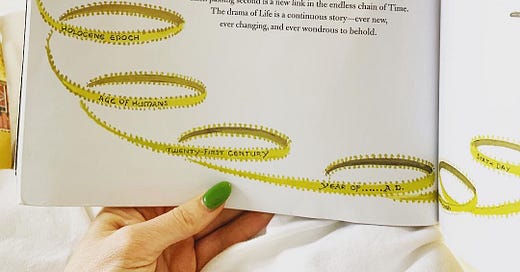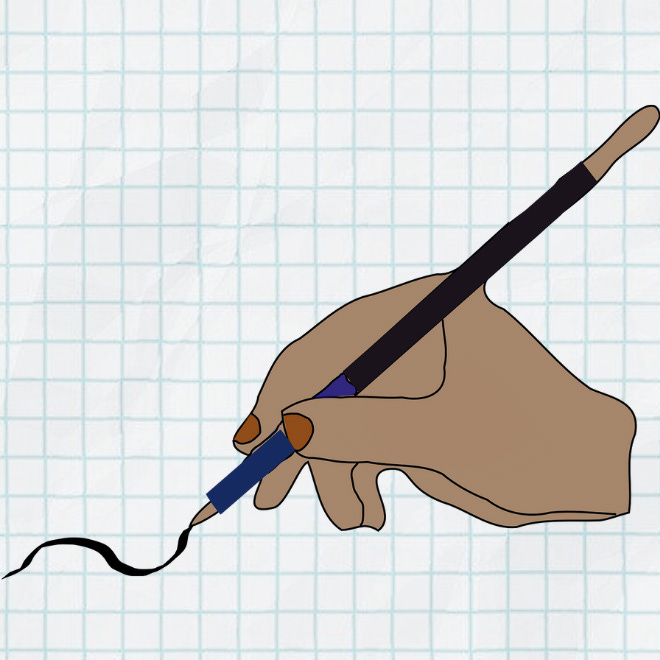A page from the classic children’s book Life Story: The Story of Life on Our Earth From its Beginning Up to Now, by Virginia Lee Burton. (Photo by Margy Thomas)
Where do ideas come from? How do they evolve? How does an idea pass from one mind to another and shape-shift as it goes? When an idea takes on solid form in the world, what’s worth remembering about the traces it bears of previous iterations?
These questions can be useful to ponder as you work to develop and express your ideas. They can help you understand why you think what you do, how your work relates to that of others who came before, and what makes your work unique.
When you trace the lineage of an idea that you’re developing, you deepen your gratitude to those whose work has influenced yours, and you recognize your interconnection with the scholarly enterprise as a whole.
As a mini-case study in scholarly lineage, consider this quick sketch of how #AcWriMoments itself came to be, as told through 14 of Helen and Margy’s memories.
1985 ~ Helen, as a graduate student, reads Wordsworth’s Prelude and is struck by the famous “Simplon Pass” passage, in which the poet transforms a moment of disappointment and loss into one of divine transcendence.
2009 or so ~ Margy, as a graduate student, reads Wordsworth’s Prelude and fixates on the “spots of time” passage, which so perfectly expresses what it feels like for a little ray of hope and inspiration to find you in the midst of difficulty.
2012 ~ Helen publishes Stylish Academic Writing, building on ideas about writing that she has developed over two decades as a literary scholar, teacher, and higher education researcher.
2013 ~ Margy reads Stylish Academic Writing and, her entire inner landscape rearranged, folds the book’s inspiration into the concept for her newborn baby business, ScholarShape.
2017 ~ Helen publishes Air and Light and Time and Space: How Successful Academics Write, a project that taught her about the importance and value of social support for scholarship.
2018 ~ Margy, amidst early efforts to articulate her Story-Argument model, attempts a gentle, reflective take on #AcWriMo by herself. She records videos with daily reflection questions alone in her apartment for 200 subscribers.
2019 ~ Helen, amidst work on Writing With Pleasure, attempts a pleasure-filled take on #AcWriMo by herself. She records her 30-day Writing with Pleasure Challenge alone in a beautiful old villa in Valparaiso for her YouTube channel (as Chile descends around her into revolutionary chaos and martial law!)
2019 ~ Margy reverse-engineers Stylish Academic Writing (on the advice of another #AcWriMoments contributor, Steven Pinker) to use as a case study in her Build Your Story-Argument Modules. This foundational ScholarShape resource, now housed in the ScholarShape Archives, draws on examples from across genres and contexts to elucidate the Story-Argument model.
2020 ~ Helen and Margy connect via email when Helen announces the launch of her business, which includes the WriteSPACE and other offerings. The two start having lots of juicy conversations courtesy of Zoom, including the one captured in “The Secrets of Structure.”
2022 ~ Helen finishes drafting Writing With Pleasure, and Margy offers detailed feedback on the manuscript — an act of scholarly generosity that Helen repays with the gift of a Gien teacup.
2022 ~ Margy jots down an idea for an #AcWriMo alternative called #AcWriNO, as in, “Academic Writing? No thank you.” In it, each daily exercise would guide participants through turning an everyday activity, such as doing the dishes, into a practice for making intangible progress on a writing project. The idea gets buried under thousands of others, and she forgets about it.
Aug. 2023 ~ Helen and Margy discuss upcoming plans, and Margy mentions the #AcWriNO concept from last year. “Hmm,” Helen says; “I like the concept, but the negative tone of the title might turn people off.” Margy says, “What about #AcWriMoments? Because a moment is a qualitative experience of time…” And so #AcWriMoments is born, as a Helen-Margy collaboration!
Oct. 2023 ~ Helen publishes a Substack post about Wordsworth’s Simplon Pass passage, which reminds Margy that his concept of “spots of time” had been an inspiration for her discarded “AcWriNO” concept back in 2022. So, she drafts the #AcWriMoments Introduction around the concept of spots of time, and, inspired by Wordsworth, defines moments as the smallest units of meaningful experience.
Nov. 2023 ~ Helen and Margy read through the 30 writing prompts that they’ve collected from 22 different writing scholars, coaches, editors, and consultants. Together they come up with the acronym SACRED to describe 6 types of #AcWriMoments suggested by the prompts: Strategic, Artisanal, Creative, Reflective, Embodied, Delicious!
And now, here we are! #AcWriMoments 2023 is going strong with 1,500+ scholarly subscribers around the world.
Prompt: Sketch a timeline showing the lineage of one of your current ideas or projects. You could locate its roots as early as your childhood, or even before you were born. Be sure to note when important influences entered the timeline so that you can see how ideas of others have intermingled with your own and bestowed some of your work’s distinct character.
Thank you for all your comments, feedback, and thoughtful participation in #AcWriMoments! We appreciate you being here with us this month and would love to hear what you think of this writing adventure so far.
Helen Sword and Margy Thomas









I find myself responding to this (initially) as a fellow supporter of academic writers. It seems like a really lovely way into reframing the role of citations in academic writing as a particular formalized way of tracing lineage. Participating in this #AcWriMoments 2023 might become a point in the lineage of some writing extending what I've written about scholarly publishing as conversation.
However, I am also thinking about the lineage of my PhD project (and subsequent book) and how that was influenced both by personal life events and by specific work that I read and scholars I admired. hmm may need to think more about that.
I absolutely adore today's post. It makes me feel all deja-vu-y just thinking about my timeline, is a summation of many 'Sliding Door' moments if my life. All the would-haves, could-haves, and should-have moments are gently sprinkling me with feelings of anemoia. Thank you, Margy and Helen. It has prompted me to enjoy where I am in this moment - and to feel excited about where I am going with my writing.